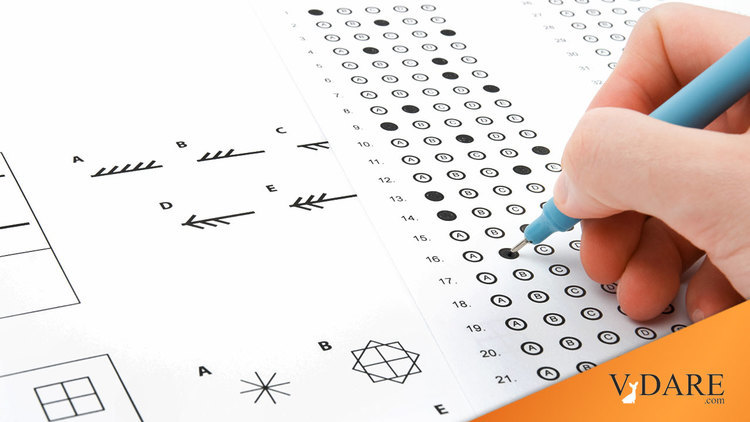


By Steve Sailer
04/19/2013
As we all know, conspiracies can’t exist. Somebody would rat out the conspiracy and then it would all be over. Therefore, conspiracy theories are not respectable.
Except, it’s highly respectable to assume that the field of psychometrics has engaged in a giant conspiracy for the last 99 years to oppress blacks. The conspiracy goes so deep that it even extends to the promotion of the arcane g factor model of IQ. As the daring rebel Stephen Jay Gould spoke truth to power: "The chimerical nature of g is the rotten core of Jensen’s edifice, and of the entire hereditarian school."
For example, Cosma Shalizi’s giant 2007 blog post "g, s Statistical Myth" has proven wildly popular. Here’s Shalizi’s own list of links to his one post:
Crooked Timber; Uncertain Principles; Pharyngula; Chrononautic Log; Pure Pedantry;Exploding Galaxies; Nanopolitan; Pyjamas in Bananas; Danny Yee; Existence Is Wonderful; Crooked Timber (again); Lawyers, Guns and Money; 3 Quarks Daily; Siris; Quantum of Wantum; Entitled to an Opinion; ArchPundit; Raw Thought; Idiolect; Boîte noire; Dissecting Leftism; The Ministry of Science;LanguageLog; Noli Irritare Leones; Work for Idle Hands; Green Apron Monkey; It Makes an Ancient Rumbling Sound; EphBlog; Medical Humanities Blog; Ars Mathematica; Crooked Timber (once more, with feeling this time); Jewcy; Lean Left; The Jed Report; Ezra Klein; The Mahatma X Files; Quantum of Wantum; Language Log (again); Social Science Statistics Blog; The Inverse Square Blog; The Useless Tree; Revelations of Silence; Robert Lindsay; Sequential Effects; Adrift in the Happy Hills; The Learner;Strongly Emergent; Quomodocumque
Shalizi has never gotten this long essay published in a peer reviewed journal and has announced he doesn’t want to talk about IQ anymore.
The fundamental problem with his argument, however, is apparent in his opening line:
About 11,000 words on the triviality of finding that positively correlated variables are all correlated with a linear combination of each other, and why this becomes no more profound when the variables are scores on intelligence tests.
This is like the old joke about the physicist, chemist, and economist shipwrecked on a desert island who are trying to open a can of beans. After the physicist offers a physics solution and chemist a chemical solution, the economist says, "Gentlemen, gentlemen, I have a much better solution. Assume we have a can opener."
Shalizi just assumes that virtually all cognitive skills are positively correlated, even though that’s the amazing thing.
Being a smart guy, many thousands of words later he gets around to trying to explain away why all these variables should be positively correlated: more or less, it’s a conspiracy among psychometricians.
By this point, I'd guess it’s impossible for something to become accepted as an "intelligence test" if it doesn’t correlate well with the Weschler and its kin, no matter how much intelligence, in the ordinary sense, it requires, but, as we saw with the first simulated factor analysis example, that makes it inevitable that the leading factor fits well. [13] This is circular and self-confirming, and the real surprise is that it doesn’t work better. …
Because, of course, there would be no rewards whatsoever for any rebel who could come up with an IQ test with predictive validity that disproves Arthur Jensen. In our society, you'd have to be a very, very brave dissident to argue against Jensen’s sacred book The g Factor. As we all know, Arthur Jensen is a god to the Establishment, which is why when Jensen died last year, President Obama flew out to deliver the eulogy at his funeral.
But, courageous Cosma Shalizi has spent about a day working on an alternative idea, and, if he wasn’t so busy, he'd no doubt finish it up and destroy Jensenism once and for all:
My playing around with Thomson’s ability-sampling model has taken, all told, about a day, and gotten me at least into back-of-the-envelope, Fermi-problem range. In fact, the biggest problem with Thomson’s model is that the appearance of g is too strong, since it easily passes tests for there being only a single factor, when real intelligence tests, such as the Weschler, all fail them. If it wasn’t a distraction from my real work, I'd look into whether weakening the assumption that tests are completely independent, uniform samples from the pool of shared abilities couldn’t produce something more realistic.
But, all the Big Money in the modern world wants blacks to continue to score worse on IQ tests, so what’s the point in anybody even trying to come up with a better IQ test when The Man would just hide it away in Area 51 with the everlasting lightbulb and the water-powered car?